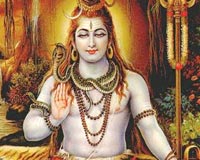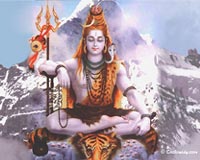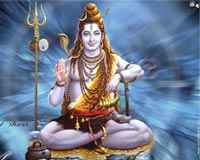Shiva
Characteristics : | Destroyer, Kind Hearted |
Other Names : | Shambhu Nath, Bhole Shankar, Shiv Shankar |
Principal Scriptures: | Shiva Mahapurana |
Consort : | Parvati |
Sons : | Ganesha, Kartikay |
Abode : | Mount Kailash |
Vahana (Vehicle) : | Nandi (The Bull Representing Strength and Happiness) |
Mula Mantra : | Om Namah Shivaye |
Shiva Gayatri Mantra: | Aum Panchvakraye Vidmahe |
Lord Shiva or Siva is considered as the destroyer of the world. Shiva is one of the most popular gods of the Hindu religion. Lord Siva forms the part of the Trimurti (Trinity), the other being Brahma, the creator and Vishnu, the preserver. Shiva is known for the complexity of his nature, representing contradictory qualities. He is the destroyer and the restorer, the great ascetic and the symbol of sensuality, the kind herdsman of souls and a wrathful avenger.
Lord Shiva- The Role
Lord Shiva represents the vital goodness in the form of Satyam, Shivam, Sundaram i.e.; Truth, Goodness and Beauty .Lord Shiva performs a celestial role of dissolution and recreation of the universe, that's why; he is mostly associated with the words, like destroyer and destruction. The role of Shiva is often confused with these terms and the difficulty arises, when the significance of his celestial role is not understood. The conception is clear itself by a slight balance between the opposing forces of good and evil. When this balance gets disturbed and continuation of life becomes unfeasible, Lord Shiva dissolves the universe. This is known as '' pralay '' and it is done in order to create another cycle .So that the unliberated souls will get another opportunity to liberate themselves from the bondage of the material world. To put succinctly, Siva protects the souls from pain and suffering that is generated by the unhealthy universe.
The conception is clear itself by a slight balance between the opposing forces of good and evil. When this balance gets disturbed and continuation of life becomes unfeasible, Lord Shiva dissolves the universe. This is known as '' pralay '' and it is done in order to create another cycle .So that the unliberated souls will get another opportunity to liberate themselves from the bondage of the material world. To put succinctly, Siva protects the souls from pain and suffering that is generated by the unhealthy universe.
Shiva - The Giver
Lord Shiva is known as the ''giver god'', lord of mercy and kindness. He always protects his devotees from evil forces like lust, greed and anger. He is the most kind -hearted God who grants boons and bestows grace to his devotees.
Shiva - The Image
Lord Shiva has the unclad body covered with ashes symbolizing the transcendental aspect of the universe. Siva's three matted locks represent the integration of the mental, physical and spiritual energies. The crescent moon becomes the part of lord's ornament symbolizing the time cycle through which creation evolves from the beginning to the end. The three eyes of Lord Shiva suggest: the Sun is his right eye, the Moon is the left eye and fire, the third eye.
The Snake around his neck symbolizes the yogic power, which he uses to dissolve and recreate the universe. The Rudraksha necklace worn by the lord shows that he uses his celestial powers without compromise,to maintain law and order. The trishula (trident), symbolizes the Lord's three fundamental powers of will (iccha), action (kriya) and knowledge (gyana).The damaru (drum) and its two sides separated from each other symbolizes the two entirely dissimilar states of existence, invisible and evident.
The bull, Nandi is linked with Shiva and it is considered as his vehicle. The bull symbolizes both power and ignorance. Tiger's skin makes Lord Shiva's clothing and his seat, which illustrates the idea that he is the source of potential energy during the dissolution of the universe. Thus, Lord Shiva is well-regarded as the ultimate organizer of the birth and death in the corporeal world.
Shiva - The Lingam
Shiva is worshipped in his invisible and an unborn form, known as the lingam. Lingam is always accompanied by the Yoni, which is the female part, adjoining the base of the lingam. The lingam symbolizes the male creative power of Shiva.
Shiva Chalisa
Shiva Chalisa is a "forty verse" prayer. Verses are recited or chanted by groups. The acts and deeds of Shiva are recalled in these verses to aid the devotee to meditate on virtuous and noble qualities.

ll Doha ll
Jai Ganesh Girija Suvan, Mangal Mool Sujaan l l
Kahat Ayodhyadas Tum, Dehu Abhaya Vardan l
ll Chaupai ll
Jai Girijapati Deen Dayala, Sada Karat Santan Pratipala
Bhal Chandrama Sohati Neeke, Kanan Kundal Nag Phani Ke
Ang Gaur Shiv Ganga Bahaye, Mundamal Tan Kshar Lagaye
Vastra Khaal Baghambar Sohe, Chhavi Ko Dekh Nag Muni Mohe
Maina Matu Ki Priya Dulari, Bam Ang Sohat Chhavi Pyari
Kar Trishul Sohat Chhavi Bhari, Karat Sada Shatrun Shaykari
Nandi Ganesh Sohe Tanha Kaise, Sagar Madhya Kamal Hain Jaise
Kartik Shyam Aur Gana Raau, Ya Chhavi Ko Kahi Jaat Na Kaau
Devan Jabhee Jaaye Pukara,Tabahin Dukh Prabhu Ap Nivaara
Keen Upadrava Taarak Bhari, Devan Sab Mili Tumhee Pukari
Turat Shadanan Ap Pathayo, Luv Nimesh Mahi Mar Girayo
Ap Jallandhar Asur Sanhara, Suyash Tumhar Vidit Sansara
Tripurasur Sang Yuddha Machayi, Sabahin Kripa Kari Leen Bachayi
Keeya Taphin Bhagirath Bhari, Purahi Pratigya Tasu Purari
Darpa Chhod Ganga Tab Ayee, Sewak Astuti Karat Sadahee
Ved Naam Mahima Tav Gayaee, Akath Anadi Bhed Nahin Payee
Pragati Udadhi Manthan Mein Jwala, Jare Surasur Bhaye Vihaala
Mahadeva Tab Kari Sahayee, Neelkantha Tav Nam Dharayee
Poojan Ramchandra Jab Keenha, Lanka Jeet Vibhishan Deenha
Sahas Kamal me ho rahe dhaari, Keenha Pareeksha Tabahi Purari
Ek Kamal Prabhu Rakheu johee, Kamal Nayan Poojan Chahin Soyee
Kathin Bhakti Dekhi Prabhu Shankar, Bhaye Prasanna Deya Icchhit Var
Jai Jai Jai Ananta Avinasi, Karat Kripa Sab Ke Ghatvasi
Dushta Sakal Mohi Nitya Sataven, Bhramita Rahe Mohe Chain Na Aave
Trahi Trahi Main Nath Pukaro, Yeh Avasar Mohi Ani Ubaro
Lai Trishool Shatrun Ko Maro, Sankat Se Mohi Ani Ubaro
Mata Pita Bhrata Sab Hoi, Sankat Mein Poochat Nahi Koi
Swami Ek Hai Aas Tumhari, Aaye Harahu Mam Sankat Bhaari
Dhan Nirdhan Kon Det Sadaee, Arat Jan Ki Peer Mitaee
Astuti Kehi Vidhi Karahu Tumhari, Shamhu Naath Ab Chook Hamari
Shanker Ho Sankat Ke Nashan, Vighna Vinashan Mangal Kaaran
Yogi Yati Muni Dhyan Lagave, Sharad Narad Sheesh Navave
Namo Namo Jai Namah Shivaye, Sur Brahmadik Par Na Paaye
Jo Yeh Path Kare Man Layee, Tapar Hot Hain Shambu Sahayee
Riniya Jo Koi Ho Adhikaari, Paath Kare So Paavanhaari
Putra Heen Ichha Kar Koi, Nishchaya Shiv Prasad Tehi Hoi
Pandit Triyodashi Ko Lave, Dhyan Poorvak Hom Karave
Triyodashi Vrata Kare Hamesha, Tan Nahi Take Rahe Kalesha
Dhoop Deep Naivedya Chadhavai, Shanker Sanmukha Path Karavahi
Janam Janam Ki Pap Nasave, Anta Vaas Shivpur Men Paave
Hey Shankar Hai Aas Tumhari, Dukh Peera Ab Harahu Hamari
ll Doha ll
Nit Nem Kar Praatha Hee ,Paath Karo Chaalis l
Tum Meri Manokaamna, Puran Karo Jagdeesh ll
Magsar Chhati Hemant Ritu, Sanvat Chausadh Jaan l
Astuti Chaalisa Shivhi, Puran Keen Kalyaan ll
Shiva Legends
Shiva is considered as the destroyer of the universe, in Hinduism. Shiva is a complex god, in terms of nature and represents contradictory qualities, being the destroyer and the restorer simultaneously. There are numerous legends surrounding Lord Shiva and his powers. Here're a few popular stories of Lord Shiva.
Story of Shiva Lingam - Why Shiva is worshipped in the Phallic Form
This is an interesting story regarding the worship of Lord Shiva in the phallic form. It is believed that once Brahma and Vishnu, the two deities of the Trinity, got into an argument regarding their supremacy. Lord Brahma declared himself to be more admired, being the creator. While the preserver, Vishnu, pronounced that he commanded more admiration. Just then a huge pillar of fire (lingam), called as Jyotirlinga, appeared in flames, before them. This Lingam enthralled both Brahma and Vishnu, with its hastily increasing size. With this incident, they forgot their quarrel and decided to find its size. Vishnu took the form of boar and went to the netherworld. Brahma assumed the form of a Swan and flew to the skies. However both of them were unsuccessful in completing the self-assumed tasks. At that time, Shiva appeared out of the lingam and acknowledged that he was the progenitor of both, Brahma and Vishnu. So, he should be worshipped in his phallic (lingam) form, and not in the anthropomorphic form.
With this incident, they forgot their quarrel and decided to find its size. Vishnu took the form of boar and went to the netherworld. Brahma assumed the form of a Swan and flew to the skies. However both of them were unsuccessful in completing the self-assumed tasks. At that time, Shiva appeared out of the lingam and acknowledged that he was the progenitor of both, Brahma and Vishnu. So, he should be worshipped in his phallic (lingam) form, and not in the anthropomorphic form.
Story of Shiva and the Hunter
Here is one more interesting story of Lord Shiva, showing his merciful nature. Once a hunter was wandering in a dense forest, to chase a deer and suddenly he found himself on the banks of river Kolidum, where he heard the roar of a tiger. In order to defend himself from the tiger, he climbed up a tree close by. The Tiger sat on the ground below the tree without the purpose to leave.
The huntsman stayed at the tree whole night and to keep himself awake, he plucked one leaf after another from the tree and threw it down. There was a Shiva Lingam under the tree and gracefully the tree turned out to be a ''bilva'' tree (leaves of this tree are adored by Shiva). Without any knowledge, the huntsman had delighted the deity by pouring Bilva leaves all night. With the arrival of the sun, the hunter looked down and found the tiger gone. In its place, Lord Shiva was standing and he prostate before the lord. With Shiva's blessings, he attained salvation from the bondage of the material world.
Different Names of Shiva
Lord Shiva is considered as the destroyer of the Universe as per the Hindu Mythology. Shiva is one of the most popular gods of the Hindus. Lord Shiva is a complex god like goddess Kali, being destroyer and restorer at the same time. Shiva is also known as Bhole Shankar, the innocent god, who gets appeased easily. Shiv Shambhu is also recognized as an ascetic, as he resides on Mount Kailash in meditation. God Shiv is worshipped usually in his phallic (Lingam) form. Special Worship of Shiva can be seen during the month of Saawan (July-August) of Hinduism. Lord Shiva is known by many different names. This list contains 108 names of Lord Shiva with their meanings:
Names | Meanings |
Aashutosh | One Who Fulfills Wishes at once |
Aja | Unborn |
Akshayaguna | God with Numberless Attributes |
Anagha | Without Any error |
Anantadrishti | of Infinite Vision |
Augadh | One Who Revels All the Time |
Avyayaprabhu | Everlasting Lord |
Bhairav | Lord of Terror |
Bhalanetra | One Who Has an Eye in the Forehead |
Bholenath | Kind Hearted Lord |
Bhooteshwara | Lord of Ghosts and Evil Beings |
Bhudeva | Lord of the Earth |
Bhutapala | Protector of the Ghosts |
Chandrapal | Master Of The Moon |
Chandraprakash | One Who Has Moon As A Crest |
Dayalu | Compassionate |
Devadeva | Lord Of The Lords |
Dhanadeepa | Lord Of Affluence |
Dhyanadeep | Icon Of Meditation And Concentration |
Dhyutidhara | Lord Of Radiance |
Digambara | Ascetic Without Any Clothes |
Durjaneeya | Difficult To Be Known |
Durjaya | Unvanquished |
Gangadhara | God Of River Ganga |
Girijapati | Husband Of Girija (Parvati) |
Gunagrahin | Acceptor Of Gunas |
Gurudeva | Master Of All |
Hara | Remover Of Sins |
Jagadisha | Master Of The Universe |
Jaradhishamana | Redeemer From Afflictions |
Jatin | One Who Has Knotted Hair |
Kailas | One Who Bestows Peace |
Kailashadhipati | Lord Of Mount Kailash |
Kailashnath | Master Of Mount Kailash |
Kamalakshana | Lotus-Eyed Lord |
Kantha | Ever-Radiant |
Kapalin | One WhoWears A Necklace Of Skulls |
Khatvangin | One Who Has The Missile (Khatvangin) In His Hand |
Kundalin | One Who Wears Earrings |
Lalataksha | One Who Has An Eye In The Forehead |
Lingadhyaksha | Lord Of The Lingas |
Lingaraja | Lord Of The Lingas |
Lokankara | Maker Of The Three Worlds |
Lokapal | One Who Takes Care Of The World |
Mahabuddhi | Exceptionally Intelligent |
Mahadeva | Greatest God |
Mahakala | Lord Of All Times |
Mahamaya | Of Great Illusions |
Mahamrityunjaya | Great Victor Of Death |
Mahanidhi | Great Storehouse |
Mahashaktimaya | One Who Has Infinite Powers |
Mahayogi | Supreme of All Gods |
Mahesha | The Almighty |
Maheshwara | Lord of the Lords |
Nagabhushana | One Who Has Snakes as Ornaments |
Nataraja | King of the Art of Dancing |
Nilakantha | Blue Necked Lord |
Nityasundara | Ever Beautiful |
Nrityapriya | Lover of Dance |
Omkara | Originator of OM |
Palanhaar | One Who Protects Everyone |
Parameshwara | First among All Gods |
Paramjyoti | Greatest Splendor |
Pashupati | Lord of All Living Beings |
Pinakin | One Who Has a Bow In His Hand |
Pranava | Originator of the Syllable of OM |
Priyabhakta | Favorite of the Devotees |
Priyadarshana | of Loving Vision |
Pushkara | One Who Gives Nourishment |
Pushpalochana | One Who Has Eyes like Flowers |
Ravilochana | Having Sun as the Eye |
Rudra | the Dreadful |
Rudraksha | One Who Has Eyes like Rudra |
Sadashiva | Eternal God |
Sanatana | Eternal Lord |
Sarvacharya | Preceptor of All |
Sarvashiva | Always Chaste |
Sarvatapana | Scorcher of All |
Sarvayoni | Source of Everything |
Sarveshwara | Lord of All Gods |
Shambhu | One Who Bestows Prosperity |
Shankara | One Who Gives Happiness |
Shiva | Always Pure |
Shoolin | One Who Has a Trident (Trishool) |
Shrikantha | of Magnificent Neck |
Shrutiprakasha | Illuminator of the Vedas |
Shuddhavigraha | One Who Has a Pure Body |
Skandaguru | Preceptor of Skanda |
Someshwara | Lord of All Gods |
Sukhada | Bestower of Happiness |
Suprita | Well Pleased |
Suragana | Having Gods As Attendants |
Sureshwara | Lord Of All Gods |
Swayambhu | Self-Manifested |
Tejaswani | One Who Spreads Illumination |
Trilochana | Three-Eyed Lord |
Trilokpati | Master of All the Three Worlds |
Tripurari | Enemy of Tripura |
Trishoolin | One Who Has a Trident in His Hands |
Umapati | Husband of Uma (Parvati) |
Vachaspati | Lord of Speech |
Vajrahasta | One Who Has a Thunderbolt in His Hands |
Varada | Granter of Boons |
Vedakarta | Creator of the Vedas |
Veerabhadra | Supreme Lord of the Nether World |
Vishalaksha | Wide-Eyed Lord s |
Vishveshwara | Lord of the Universe |
Vrishavahana | One Who Has Bull as His Mount |


No comments:
Post a Comment